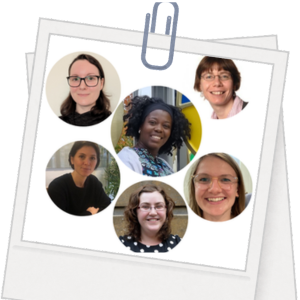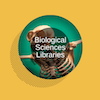
Providing accessible and inclusive services
The Biological Sciences Libraries Team is committed to providing a service based on equality, diversity and inclusion (EDI) values. One of the ways in which we work towards providing a more accessible range of services and spaces for our diverse range of users is through collaborating with other teams around the University. These collaborations include working with the Accessibility & Disability Resource Centre, the University Information Services, the Equality and Diversity team, the Cambridge Centre for Teaching and Learning, as well as the Cambridge Students' Union.
We have included some of the services that we either contribute to or wish to highlight below.
The wellbeing of our communities is important to us and so we have different initiatives and projects across the Biological Sciences Libraries to help and support the diverse range of people that use our services. Examples of what we've been doing lately include providing comfy seating such as sofas and beanbags in some of our spaces; providing whiteboards so you can leave us feedback and fun doodles for others to enjoy; developing dedicated EDI book collections on a range of topics; and providing jigsaws and other resources to help people take a break.
We're always looking at new things to add or develop so if you have any ideas of what wellbeing initiatives or resources you would like to see in your library space, let us know!
The Cambridge Libraries Accessibility Service was established in November 2020 and is based at the University Library.
The service works across the Cambridge University Libraries network to ensure that library users have equal access to services and resources regardless of their accessibility needs. The service also works closely with other key areas of the university such as the Accessibility & Disability Resource Centre.
For more information about how we can support you in accessing resources, please either contact your college or departmental library, or visit the dedicated Cambridge Libraries Accessibility Service guide for details and further contacts.
The Cambridge Libraries Accessibility Service has a curated wellbeing reading list with lots of online resources on a wide range of themes such as mental health, gender identities, and race. To make suggestions about new additions to this list, please contact the Ebooks Team to make a recommendation.
The Biological Sciences Libraries Team is working towards ensuring that all undergraduate teaching reading lists are available online through our Reading Lists Online service. Launched in 2020 across the triposes that are taught within the School of Biological Sciences, Reading Lists Online provides quick and easy access to online resources as well as information about where to get something that is kept on a physical library shelf in Cambridge.
Where something is not available online, we endeavour to either purchase a version that is or make scans available so that students can keep learning with as few barriers as possible.
We also use features of Reading Lists Online such as tagging to highlight if a resource is available online, if it is essential reading, as well as if a scan is available. Often members of the team will get access to reading recommendations at the same time as students when they are uploaded onto Moodle, so there might occasionally be a slight delay in new content being added to Reading Lists Online.
We work closely with the Cambridge University Libraries Decolonisation Working Group as well as the Decolonising through Critical Librarianship group to critically evaluate and actively identify historical and modern power relations that are rooted in colonial views of the world and its peoples, that are found across our libraries and their collections. Through this work we aim to be transparent about and to actively re-contextualise library holdings which are a legacy of colonialism and occupation, as well as developing modern collections that include a diverse range of voices and perspectives to support current teaching and research activities within our departments.
We endeavour to advocate and raise further awareness for this work through our teaching and research support services by facilitating additional aspects such as open publishing practices that make University research outputs available to our international communities, both within academia and outside.
Members of the Biological Sciences Libraries Team are active participants in many of the University of Cambridge's range of Diversity Networks and bring much of what they discover through events and awareness-raising activities back into developing new library services and establishing best practice approaches to what we do. This includes working closely with the University's Equality Champions to push for meaningful change across our organisation for marginalised and/or minoritised groups.
Many of the Team also engage with local-level departmental initiatives through contributing to dedicated committees and other work around equality, diversity, and inclusion matters advocating for staff and student groups.
The Biological Sciences Libraries Team is made up of a diverse group of people and we are always looking for new ways to develop and improve our services for our various communities. You can always get in touch to talk to us about how we can better support you during your time at Cambridge.
If you are a disabled student, the Accessibility & Disability Resource Centre (ADRC) is a great source of support. Whether you need support for a short period, or for the duration of your studies, the ADRC Advisors will be able help you. The ADRC works with any student who experiences barriers in accessing education due to having or being considered to have an impairment. This can include, but is not limited to, unseen impairments and mental health conditions.
The University Counselling Service has a range of self-help materials to assist anyone who may need them. There is also the option to speak to a trained and accredited counsellor or therapist should you need to. The team also has specialist counsellors including a BME counsellor and several Mental Health Advisors.
The Cambridge Students' Union provides many opportunities to connect with people with similar interests to you through their extensive list of societies. The Student Union also has several sabbatical officers who dedicate their time to key areas of the student experience. There are also many Student Union campaigns to get involved with including the BME Campaign, the LGBT+ Campaign and the Ethical Affairs Campaign.











